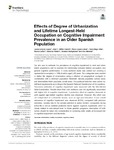Effects of degree of urbanization and lifetime longest-held occupation on cognitive impairment prevalence in an older spanish population

Ver/Abrir
Use este enlace para citar
http://hdl.handle.net/2183/18275
Excepto si se señala otra cosa, la licencia del ítem se describe como Creative Commons Attribution 4.0 International License (CC-BY 4.0)
Colecciones
- Investigación (FCS) [1293]
Metadatos
Mostrar el registro completo del ítemTítulo
Effects of degree of urbanization and lifetime longest-held occupation on cognitive impairment prevalence in an older spanish populationAutor(es)
Fecha
2017-02-13Cita bibliográfica
Lorenzo-López L, Millán-Calenti JC, López-López R, Diego-Diez C, Laffon B, Pásaro E, Valdiglesias V, Maseda A. Effects of degree of urbanization and lifetime longest-held occupation on cognitive impairment prevalence in an older spanish population. Front Psychol. 2017 Feb 13;8:162.
Resumen
[Abstract] Our aim was to estimate the prevalence of cognitive impairment in rural and urban elderly populations and to examine the relationship between lifetime occupation and general cognitive performance. A cross-sectional study was carried out covering a representative sample (n = 749) of adults aged ≥65 years. Two categories were created to define the degree of urbanization using a criterion of geographical contiguity in combination with a minimum population threshold: densely populated (urban) areas and intermediate-thinly populated (rural) areas. Occupational histories were ranked by skill level requirements according to the Spanish National Classification of Occupations. Prevalence estimates of cognitive impairment were measured with the Mini-Mental State Examination. Results show that rural residence was not significantly associated with higher risk of cognitive impairment. A protective effect of cognitive demands at work against age-related cognitive decline was observed. However, this effect was not independent of confounder factors, such as age and education. A low overall prevalence of cognitive impairment was observed (6.5%), compared with previous estimates, possibly due to the sample selection in senior centers. Occupation during active life is not an isolated protective factor against cognitive impairment, and it is closely related to educational level. In future geriatric programs, description of both factors should be taken into consideration in screening older adults at increased risk of cognitive impairment and dementia.
Palabras clave
Urbanization
Rurality
Occupation
Cognition
Elderly
Rurality
Occupation
Cognition
Elderly
Versión del editor
Derechos
Creative Commons Attribution 4.0 International License (CC-BY 4.0)
ISSN
1664-1078






